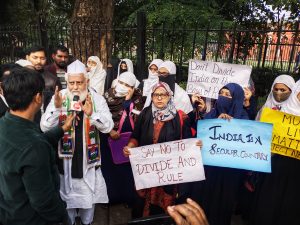The Citizenship (Amendment) Act, passed into law by India’s federal parliament in December 2019, proved to be a highly controversial move. In a nutshell, this legal move, usually referred to as the CAA for short, offers citizenship for persons who came to India from one of the following three neighboring countries while fleeing persecution: Afghanistan, Bangladesh and Pakistan. However, citizenship can be granted provided that they had arrived by December 31, 2014, and that they are of any other religious community in those countries apart from the Muslim one. This last caveat caused large-scale protests in the country and condemnation outside its borders. As half a year has passed since the CAA was voted through, it is now time for a reckoning: did the law affect New Delhi’s international position?
In my commentary published for the Indian think-tank, Observer Research Foundation, I argued that another contentious issue – India’s ruling party’s recent policies on Kashmir – had hurt New Delhi’s international image, but not its real position in the world. The same conclusion, I believe, generally stands true for the CAA controversy as well.
Has any nation, bank, or company cancelled any economic deals with New Delhi because of CAA? Not to my knowledge. Have any sanctions been thrown at India? No. Has any country used military force, even by proxy, in reaction to New Delhi’s passing of the controversial law? Again, the answer is no, as Pakistan-connected entities had been active in India long before December 2019.
Islamabad unsurprisingly criticized the Indian government’s move in strong words. Pakistani Prime Minister Imran Khan suggested that the CAA’s passing may even lead to a conflict between the two countries. Yet, given that the relations between the two countries are constantly strained, such saber-rattling rhetoric came neither as surprising nor as a change to the overall international equation.
A useful summary of various critical voices, published for The Diplomat by an Indian expert, Rajeswari Pillai Rajagopalan, shows that the Indian government’s image in the world did indeed take a beating. Yet, most of these acts of condemnation remained in the realm of diplomatic rhetoric or discussions on human rights. These reactions included censure from certain Islamic nations, such as Indonesia and Iran, and an announcement from the Office of the High Commissioner for Human Rights (OHCHR) that it was planning to “file an application on the CAA in the Indian Supreme Court.”
There were also diplomatic spats between India and Bangladesh, particularly after insensitive comments by Indian Home Minister Amit Shah and Defense Minister Rajnath Singh. These, as pointed out by Amit Ranjan for the The Diplomat, led to the cancellation and postponement of certain visits and talks, but so far no other major effect is apparent.
Among the three neighbors, the migrants from which will be affected by CAA, New Delhi has enjoyed friendliest relations with Afghanistan (ever since 2001). Thus, displeasure over the new legal act in this country should be worrying for India. Even ex-president Hamid Karzai, known to be particularly close to India, asked the New Delhi government “to treat all Afghans equally” (as most of the nation’s citizens are Muslims). Still, there is no evidence that the controversy pulled Afghanistan-India relations downward. Given the scale of New Delhi’s past assistance to Afghanistan (a subject I summarized here) and the image India enjoys in that country, it is possible that CAA will not cause large-scale diplomatic conflict with Kabul.
United States Deputy Assistant Secretary of State Alice Wells voiced careful concern about CAA just after she came back from the Raisina Dialogue, held in New Delhi in January 2020 (in her briefing before the State Department). This did not stop U.S. President Donald Trump’s visit India nearly a month later, however.
At the end of April, the United States Commission on International Religious suggested in a new report that the U.S. government should designate India a “country of particular concern” and even impose sanctions on Indian “agencies and officials responsible for severe violations of religious freedom by freezing those individuals’ assets and or barring their entry into the United States.” The CAA was the primary, though not the only, reason given by the commission to justify this view. Yet, this did not mean that its conclusions reflected Washington’s official position. It is improbable that the United States will decide to introduce such sanctions at a time of a fast-growing India-U.S. partnership, especially given that the “agencies and officials” responsible for the CAA would include some of India’s most influential politicians and most significant ministries.
As for the European Union, various groups of parties introduced their draft resolutions in the European Parliament, all of which criticized the CAA to various degrees. Elements of few resolutions were then condensed into one draft resolution. Further moves signaled that the EU did not want to put its ties with India in peril for the sake of this issue, however. At the end of January, it was decided that the EU Parliament’s vote on the resolution was to be postponed until late March, effectively moving it after the planned EU-India summit (which subsequently was also postponed due to the COVID-19 pandemic, and has not taken place till the time of writing). Moreover, as noticed by Geeta Mohan for India Today, the EU’s Spokesperson for Foreign Affairs and Security Policy stressed that the proposed resolutions were “only drafts tabled by various political groups,” and not the official position of the European Union as such.
It must be added, however, that the issue of CAA is connected to another contentious legal decision: the gradual introduction of the National Register of Citizens (NRC) in India. Since in the previous decades the largest influx of people to India came from Bangladesh, the realization of both CAA and NRC would have to mean that many Bangladeshi nationals will be deported. This issue may thus affect New Delhi’s ties with Dhaka in the future.

































